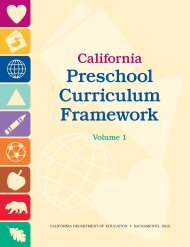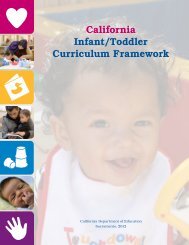California Preschool Learning Foundations - ECEZero2Three ...
California Preschool Learning Foundations - ECEZero2Three ...
California Preschool Learning Foundations - ECEZero2Three ...
Create successful ePaper yourself
Turn your PDF publications into a flip-book with our unique Google optimized e-Paper software.
ity of the teacher-child relationship<br />
and that conflict in the relationship<br />
is a predictor of children’s poorer<br />
academic performance and greater<br />
behavior problems, sometimes years<br />
later (Birch and Ladd 1997; Hamre<br />
and Pianta 2001; La Paro and Pianta<br />
2000; Pianta, Steinberg, and Rollins<br />
1995; Pianta and Stuhlman 2004a,<br />
2004b). In a manner similar to the<br />
way in which successful peer relationships<br />
in the classroom contribute to<br />
children’s enthusiasm for learning and<br />
classroom success, so is the teacherchild<br />
relationship a significant contributor—both<br />
before school entry and<br />
afterward.<br />
The indicators of young children’s<br />
close relationships with preschool<br />
teachers and caregivers are remarkably<br />
consistent with the behavioral<br />
indicators of children’s attachments to<br />
their family caregivers. In both cases,<br />
the significant features are the extent<br />
to which children seek security and<br />
support from their primary preschool<br />
teachers and caregivers and the extent<br />
to which they contribute to maintaining<br />
positive relationships with those<br />
adults. <strong>Preschool</strong>ers exhibit their reliance<br />
on their primary preschool teachers<br />
through their preference to be with<br />
the adult; the adult’s capacity to assist<br />
and comfort them when others cannot;<br />
their efforts to attract the teacher’s<br />
positive regard (and avoid criticism by<br />
Although these relationships are<br />
not interchangeable, and close<br />
relationships outside the home<br />
do not diminish the strength of the<br />
young child’s attachments to the<br />
parents, it is apparent that both<br />
kinds of relationships are<br />
developmentally important.<br />
Several studies have confirmed<br />
that young children’s success in<br />
kindergarten and the primary grades<br />
is significantly influenced by the<br />
quality of the teacher-child relationship<br />
and that conflict in the relationship<br />
is a predictor of children’s poorer<br />
academic performance and greater<br />
behavior problems, sometimes<br />
years later.<br />
33<br />
this person); their pleasure in shared<br />
activity with the adult; and the greater<br />
ease with which they can disclose<br />
and discuss troubling topics (such as<br />
distressing experiences) with the primary<br />
preschool teacher or caregiver.<br />
Although this similarity in behavioral<br />
indicators should not be taken to indicate<br />
that young children’s relationships<br />
with their parents are identical<br />
to their relationships with their<br />
primary preschool teachers and<br />
caregivers in early childhood settings—<br />
clearly, they are not—it is important to<br />
recognize that children derive security<br />
and support from their close relationships<br />
in these settings comparable to<br />
the confidence they derive from attachment<br />
relationships at home.<br />
Friendships<br />
<strong>California</strong> Department of Education • <strong>Preschool</strong> <strong>Learning</strong> <strong>Foundations</strong>, Volume 1<br />
Our understanding of preschool<br />
children’s friendships has advanced<br />
in concert with our knowledge of peer<br />
interactions, both of which reveal<br />
children’s skill and sophistication<br />
in peer sociability to be greater than<br />
was earlier believed. Friendships are<br />
important to children’s adaptation to<br />
school and their academic success for<br />
the same reason that successful peer<br />
interactions are important: they cause<br />
kindergarteners and elementary grade<br />
SOCIAL-EMOTIONAL DEVELOPMENT
















